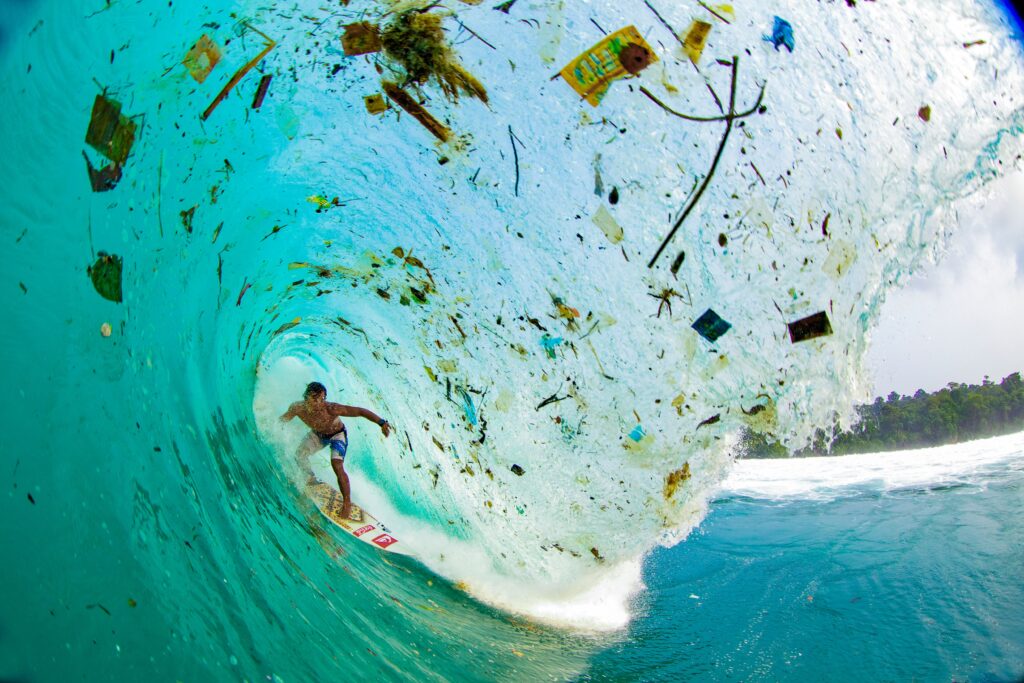
Diving into action, Wes Carter, the third-generation president of Atlantic Packaging, one of the largest privately held packaging companies in America has started his mission of transforming the packaging industry one wave at a time. A native of Wrightsville Beach, NC, and an avid outdoorsman, Carter founded A New Earth Project after recognizing the packaging supply chain his company was a part of was suffocating our oceans with plastic pollution. Rather than ignoring the growing crisis, Carter used his resources to right the ship and create a new goal of advocating and offering more environmentally friendly products. “When you’re embedded in the supply chain that’s creating the problem you can choose to keep your head in the sand and ignore it, but I couldn’t do that because I love the outdoors,” Carter says, driven by his profound passion for nature.
In recent years, consumer brands have become more open to adopting more sustainable packaging but there is still a long way to go. “Seven to eight percent of the packaging that ends up at your house ends up in the environment. But if that packaging is made of paper in about 8-10 weeks it’s gone. If it’s made of plastic, it’ll be gone in a thousand years,” Carter explains. The vision of A New Earth Project is to design and test efficient fiber-based packaging that rids the world’s oceans of this plastic pollution. From the paper shipping mailers to the innovative mushroom packaging, these products can be recycled in your curbside recycling bin or will break down naturally becoming harmless to ecosystems it may end up in. Carter predicts the shift to more sustainable packaging can be seamlessly integrated into our society because of how common paper products are in our world today. Like the Amazon cardboard boxes on your doorstep, all of them can be recycled in America’s established paper recycling systems. The right idea is for us to change our perspective from what we used to see as a waste to a resource.
Though the idea of a clean earth is enticing, new changes in packaging are not always eye-catching. “The realization that I had is that sustainability needed to be branded. I wanted sustainable packaging to be awesome.” Says Carter, who built collaborations with some of the most impressive pro-surfers, snowboarders, and outdoor enthusiasts such as Koa Smith, Kelly Slater, and Cody Townsend to accomplish his goal. The team gathered perspectives from across the globe, from the thrill-chasers who hurtle off the world’s tallest snowy peaks to the pro-surfers who spend their days in the ocean. Their global perspectives enrich the narrative and enlarge the audience with their thousands of followers. “Ultimately the hope was that the outdoor industry would lead the sustainable packaging transition and that through storytelling we would inspire other brands to all join.” Says Carter. And he was right, inspired by the mission of A New Earth Project, Carter’s packaging customers such as William Sonoma, Urban Outfitters, and Bass Pro Shops have agreed to transition to sustainable packaging. “In a couple of months, we moved William Sonoma out of all of their bubble wrap, inflatable air pillows, and all of their foam to all paper-based packaging and eliminated 400,000 pounds of single-use plastics annually.”
As the next generation of our world, we face the consequences of the dire impact of plastic pollution that’s altering our future. I saw this firsthand on a scuba diving trip in Bali last summer as I collected trash off coral reefs and observed piles of litter swamping the beaches. The future of our planet rests on the choices of today’s youth as we determine whether or not the solutions created by companies such as A New Earth Project will prevail. When asked for advice for our generation Carter answered; “We need young people like you guys out there to be conscious of who you shop with and rewarding companies that are making these sustainable shifts because ultimately consumer demand is what drives these companies more than anything else.” By choosing to support forward-thinking companies, our dollars can foster a market for not only sustainable packaging but also sustainable products that contribute to a legacy of environmental stewardship.

